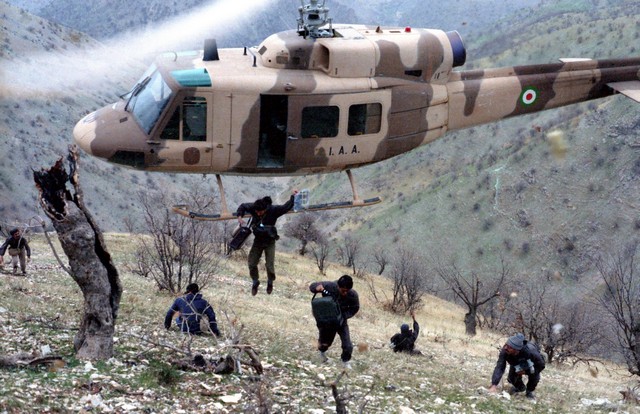By Akbar E. Torbat
Because the economic pressures against Iran have not succeeded to completely shut down the entire Iran’s nuclear program, it seems political strategies are now accentuated to confront the regime in Tehran. One such strategy could be the release of details of how the West managed to overthrow the Shah in 1979 and helped the clerics to form the Islamic Republic. The BBC released an interview with the late Grand Ayatollah Hossein-Ali Montazeri, in which he said that the US government prepared the ground for victory of the Islamic revolution in Iran.
Historically the British and later the United States have used the Islamic clerics’ influence to promote their interests in Iran. To curb the power of the Leftists, nationalists, and secular political groups, the US and its Western allies have supported the Islamic factions in Muslim countries for decades. During the Iranian revolution, the Western intelligence agencies played an important role in promoting the Islamic factions led by the clerics. The key clerics that founded the Islamic republic had close ties with the West.
Ayatollah Ruhollah Khomeini had been exiled in Najaf. On October 6, 1978, he was expelled from Iraq because of his efforts to radicalize the Iraqi Shias against the Iraq’s government. Subsequently, he resided in Neauphle-le-Chateau near Paris.[1] The Western intelligence services gathered around the residence of Ayatollah Khomeini in Neauphle-le-Chateau to manage the establishment of the Islamic Republic. The Western media, and in particular the Persian radio BBC became a propaganda tool to turn the 1979 revolution away from the secular factions in favor of the Islamic groups hoping that the Islamists would serve the interests of the West. From France, Khomeini made anti-Shah speeches which often were broadcasted by the BBC Persian language radio to Iran. He encouraged the Iranians to rise against the Shah’s government.
Khomeini returned to Iran, on February 1, 1979, with a large entourage aboard a French government jet. Three key persons who had established connections with Khomeini while he was exiled were Ebrahim Yazdi, Sadegh Ghotbzadeh, and Abul-Hassan Bani-Sadr(the first President of Iran).[2] They had joined Khomeini in Paris and came aboard the same aircraft that brought Khomeini to Tehran. Professor Richart Cottom , a pro-Khomeini “Iran Expert” had made friendship with Yazdi and Ghotbzadeh years earlier.[3] Yazdi became Khomeini’s translator in France and later his foreign minister. Few days after his arrival, Khomeini ordered the formation of a provisional government to replace the Shah’s government which at that time was headed by Shahpour Bakhtiar, the Shah’s last prime Minster.
BBC Released the Dead Cleric’s Interview
On December 17, 2014, the Persian BBC television program released an edited version of an interview with the late ayatollah Hossein-Ali Montazeri.[4] BBC had interviewed Montazeri about fifteen years ago, but the interview had not been broadcasted until now. Montazeri was a leading cleric who helped to write the 1979 constitution and was once heir-apparent to the Islamic Republic’s founder, Ayatollah Khomeini. He resigned from that position because of his opposition to mass executions of political prisoners in 1988 by Khomeini’s order. In 1997, Montazeri was placed under house arrest in the holy city of Qom because he had questioned the unaccountable rules exercised by the supreme leader Ali Khamenei. Montazeri passed away on December 19, 2009. He had good relations with the British and his memoirs have been banned in Iran.
At the minute 18 of the tape Montazeri said “Our [Islamic] revolution victory was almost due to the environment that President Jimmy Carter had prepared.” He further mentioned, a constitution for the new government had been drafted in Paris by Dr. Hassan Habibi and he inserted the key word Velayat-e Faghih (Guardianship of the Jurist) in the constitution, making the otherwise secular constitution an Islamic one and giving ayatollah Khomeini the sole authority to rule Iran. A more detailed written version of the BBC’s interview with Montazeri had been previously published in several issues of Nimrooz newspaper in February 2000. In the written version Montazeri had said he favored free market capitalism
The involvement of western powers in the Islamic uprising of 1979 have been explained in many books and articles published previously. For example, one may refer to the books “Answer to History” by Mohammad Reza Shah Pahlavi, or “Hostage to Khomeini” by Robert Dreyfuss, and the “Last Shah of Iran” by Hooshang Nahavandi.
As a matter of fact, the Western powers had intervened in Iranian internal affairs many times before. A very important one is the 1953 coup orchestrated by the US and Britain against the nationalist government of then Prime Minister Mosaddegh. Ayatollah Abul-Qassem Kashani, a powerful cleric at the time, in collaboration with the West, mobilized the mobs, mullahs, and royalists to provide support for a coup which brought Mosaddegh down in 1953. Because of these historical disasters, Iranians are very antagonistic to foreign interventions in their country.
It is now about 35 years since the formation of the Islamic Republic. Under the Freedom of Information Act, the full or partial disclosures of the US government involvement in bringing Khomeini to power may surface to show how the West acted to change the Shah’s government to the present clerical regime in Iran. However, even before such disclosures, the fact that the West orchestrated a “regime change” in Iran in 1979 and brought the clergy to power is already known to the Iranian people inside and outside Iran. Therefore, the Iranian people should stop the clerics’ concessions to the West in return for preventing these historical “revelations” to surface by the BBC and the like.
Akbar E. Torbat teaches economics at California State University, Los Angeles. He received his PhD in political economy from the University of Texas at Dallas.
24 December, 2014
Countercurrents.org

